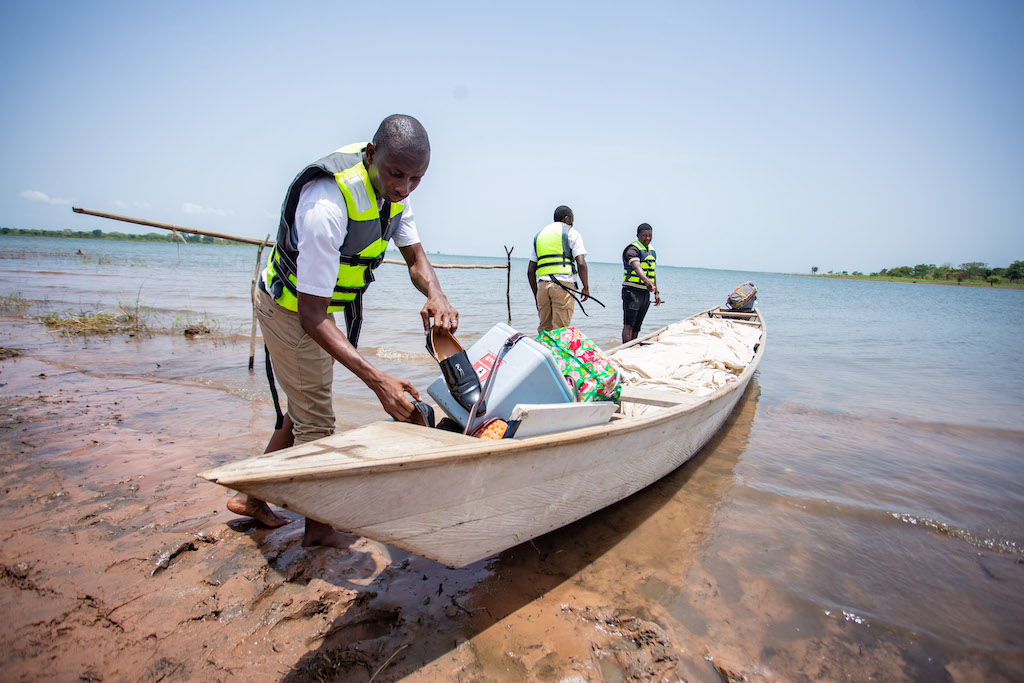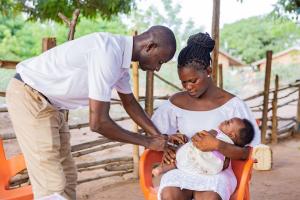Catching up on missed childhood vaccinations
Accra ‒ COVID-19 pandemic-related disruptions meant that mother Beauty Setornyo was afraid to take her son Dufe Dodzi from their island home in Dadato, in Ghana’s eastern Oti Region, to the mainland health centre for his routine childhood vaccinations, leaving him vulnerable to diseases such as measles, polio and yellow fever.
Dufe was among about 4200 zero-dose children from the hard-to reach area targeted during an intensive three-day drive in July 2022 to reverse immunization declines that are impacting tens of thousands of children in Ghana.
“Now my mind is at peace that [my son] has received all the vaccinations he missed.” Beauty Setornyo, Oti Region, Ghana
Between 2019 and 2020, coverage of the third dose of pertussis-containing vaccine (DTP3), which protects against life-threatening childhood infections such as diphtheria, tetanus and pertussis, fell from 99% to 97% – leaving over 32 000 children unprotected countrywide.
Together with World Health Organization (WHO) and Gavi, the Vaccine Alliance, Ghana’s Ministry of Health procured a dedicated medical boat to transport vaccinators to Setomyo’s island community. With five of the region’s nine districts surrounded by rivers, and the other four by mountains and valleys, the 320 island or riverine communities were, until then, only reachable by one barely usable boat.
WHO also supported the training of 90 health workers and community-based volunteers on catch-up strategies to identify and immunize all children who had missed a vaccine. They played a critical role in sensitizing parents and caregivers and generating demand for vaccination.
“WHO’s timely intervention of renting boats, providing logistics and technical support for us was critical in restoring immunization services in this region…” Dr Osei Kuffour Afreh, Regional Director of Health Services, Oti Region
“During the pandemic, our weekly immunization reach was reduced from about 200 to about 50 children,” says Etornam Tsakesuh, the principal community health nurse at the Dadoto community health planning and services compound.
“But the logistical support and the training we got on the catch-up policy enabled us to take the services to the doorsteps of families, allowing us to increase our reach to about 300 children a week.”
WHO is overseeing the construction of three dedicated medical boats to ensure ongoing access to health care, including immunization services, for the island and riverine communities.

A total of 322 communities were reached during the mop-up vaccination campaign between 12 and 15 July 2022, with more than 4100 vaccine doses administered.
Ghana’s national effort to restore routine immunization also saw the country record a 7% increase in the number of districts achieving more than 90% coverage for DTP3 between 2020 and 2022. Additionally, significant strides were made towards vaccine equity, with a 10% increase in the number of districts achieving more than 80% DTP3 coverage over the same period.
“WHO’s timely intervention of renting boats, providing logistics and technical support for us was critical in restoring immunization services in this region, especially to the island communities, which account for about 30% of the population,” says Dr Osei Kuffour Afreh, Oti’s Regional Director of Health Services.
Setornyo, meanwhile, is relieved that she has caught up on her son’s critical vaccinations. “Now my mind is at peace that he has received all the vaccinations he missed,” she says. “I am grateful that the health workers are able to now reach us here, without us having to go to them.”
